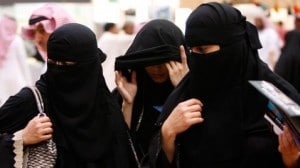Saudi Women Win Right to Vote
September 26, 2011
 ABC News – Women in Saudi Arabia will be given the right to vote and run in future municipal elections, and will be appointed to the all-male Shura advisory council, King Abdullah announced today.
ABC News – Women in Saudi Arabia will be given the right to vote and run in future municipal elections, and will be appointed to the all-male Shura advisory council, King Abdullah announced today.
Women will not be allowed to vote in municipal elections this Thursday, but will be able to in the following municipal elections in 2015. Women will be appointed to the Shura Council, an advisory body established in 1993 that is selected by the monarch, starting with its next term, the king said.
Abdullah made the announcement today during his annual speech at the opening of the new term of the Shura Council.
“Because we refuse to marginalize women in our society in all roles that comply with Sharia,” Abdullah said, referring to the Islamic law that governs many aspects of life in the kingdom, “we have decided, after deliberation with our senior clerics and others to engage women in the Shura Council as members in line with the Sharia regulations, starting from the next term. Secondly women have the right to run for municipal council membership. They also have the right to vote within Sharia regulations.”
Abdullah is known as a reformist in the ultra-conservative nation, but change has been slow-moving. Women still cannot drive or leave the country unaccompanied, and the sexes are segregated in public.
Over the summer, fueled by social media and recent uprisings in the Arab world,Saudi women took to the capital’s streets in their cars to protest the ban on female drivers.
“[Today’s announcement] is definitely an important step forward that there is a promise that women will be allowed to vote in the next municipal election, but not a promise that means anything for the election happening now,” Sarah Leah Whitson, director of Human Rights Watch’s Middle East and North Africa division, told ABC News.
“This announcement does nothing to address the systematic and institutional discrimination against women which includes not only no right to drive, but no right to make decisions about their everyday lives, including the right to seek an education, the right to employment, the right to travel, the right to open a bank account, even the right to obtain medical care without the permission of a male guardian,” she said.
There is a fear that when 87-year-old King Abdullah dies, the reforms he has put in place will be disregarded.
“It is a promise, it is not actually a legislative reform,” Whitson said. “It’s not sanctified in any kind of law. The risk is if the next king comes in and says, ‘We won’t do that after all.’ One of the biggest problems of King Abdullah as a reformer is that the actions that will last beyond his lifetime are really at question and at risk.”
But despite the potentially unofficial nature of the change, the United States was quick to support the decision.
To read the ABC story, click here.

